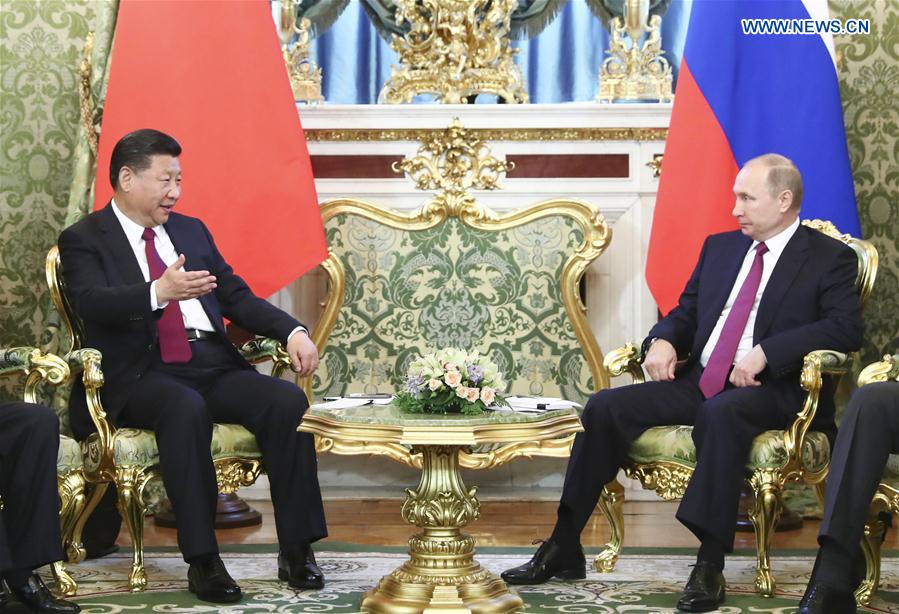
Chinese President Xi Jinping holds talks with his Russian counterpart Vladimir Putin at the Kremlin in Moscow, Russia, July 4, 2017. (Xinhua/Xie Huanchi)
BEIJING, July 5 (Xinhua) -- Chinese President Xi Jinping's recently concluded visit to Russia featured stronger bilateral ties and an expanding cooperation agenda and can serve as a stabilizer for the world to navigate a turbulent international environment.
China-Russia relations are at their "best time in history" with exchanges between Xi and his Russian counterpart Vladimir Putin playing a crucial role in bilateral relations.
A joint statement signed by the two on further deepening comprehensive strategic partnership of coordination, called on both countries to continue the synergy of their respective development strategies as well as between the China-proposed Belt and Road Initiative and the Russia-led Eurasia Economic Union.
Huge potential is expected to be tapped for cooperation on cyber security, Arctic research, space, trade, technology, connectivity, finance and BRICS cooperation.
The development of bilateral relations is attributed to frequent and effective meetings between the two heads of state.
In March 2013, just days after he assumed office, Xi paid a state visit to Russia, the first stop of his first foreign trip as head of state. Xi and Putin have met for more than 20 times over the past five years.
During their meetings at international conventions, such as the G20 summit in 2016, Xi called for closer cooperation on international and regional issues and resolutely safeguarding the principles of the UN Charter.
In 2015, which was the 70th anniversary of the end of World War II, Xi attended a Victory Day parade in Moscow's Red Square, while Putin was present at Beijing's own victory parade, showcasing their firm determination to safeguard the post-war international order.
China-Russia relations have become an important factor in safeguarding the international strategic balance, world peace and stability.
During their talks at the Kremlin Tuesday, Xi and Putin pledged to build strong ties between the two neighboring powers into a "ballast stone" for world peace and stability as the two countries seek to coordinate more closely for a better world.
Underpinning such ballast stone efforts, the two countries vowed to work together and establish a comprehensive and effective security mechanism in Northeast Asia as early as possible, while stressing that dialogue and consultation are the only viable solution to crisis on the Korean Peninsula.
They also expressed strong opposition against the unilateral installation of anti-missile systems in Europe and Asia-Pacific by some specific countries at the expense of others' security interests.
Regarding Syria, the two countries called for the respect of Syria's sovereignty and independence, and urged comprehensive dialogue inside the Middle East nation to settle the current crisis through political and diplomatic means.
Different from a military alliance, the China-Russia partnership rejects the outdated cold-war mentality and does not target any third party.
Practice has proven that China-Russia relations are mature and solid, able to withstand international troubles, and serve as an example for harmonious coexistence and win-win cooperation between world's major countries and neighbors.
If all major powers and neighbors could learn from this example, it will not only serve their own interests, but also help preserve world peace and stability.




